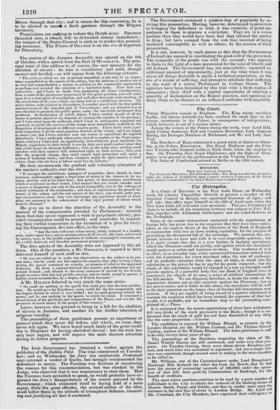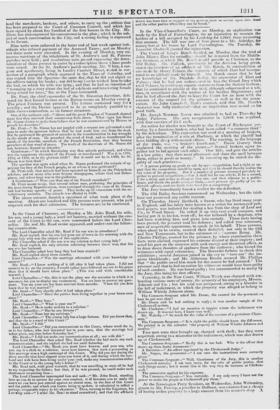ifirtrnpa T it! .
At a Court of Directors at the East India House, on Wednesday week, Sir Charles Theophilus Metcalf, at present a member of the Supreme Council in Bengal, was appointed Governor of Agra ; and will take that office upon himself on the 22d of April next, when the New East India bill will come into operation. The new Presidency of .Agra is to include all the remaining territory now subject to Fort Wil- liam, together with Allahabad, Goruckpore, and the ceded districts in the Nerbuddab.
Some of the recent ',transactions connected with the negotiation of foreign bills has given rise to the suspicion that they have been under- taken at the express desire of the Directors of the Bank of England, in conjunction with two or three leading capitalists, for the purpose of preventing the threatened fall of the exchange. We mention this sus- picion, because we have met with it in very respectable quarters ; but it is quite certain that this is a new feature in banking operations, which the Directors could not justify, and against which the merchants would protest as unfair and injurious to them. The tendency of it is to affect, in an irregular way, every commercial transaction entered into with the Continent ; for every merchant takes the rate of exchange, and its probable variations from the state of trade, as much into his calculation as the prices he has to pay for his goods exported ; but the whole of this calculation would be changed in a way no foresight could provide against, if a powerful body like the Bank of England were to commence, for objects of its own, a series of artificial transactions in the bill-market. We are disposed, therefore, to doubt the truth of the imputation thrown out on this occasion against the Directors ; but as the power exists, and is liable to this abuse, the tnerehants will do well to fix their attention on the larger class of foreign bill transactions now current. If they are capable of being traced to a quarter calculated to warrant the suspicion which has been created, the exposure of that fact would, it is probable, put an immediate stop to the proceeding com- plained of. —Times.
It is estimated that the recent exportations of silver have withdrawn full two-thirds of the stock previously in the Bank ; though it is un- derstood that the stock a gold has not been diminished in any thing like the same proportion.—Courier.
The candidates to succeed Sir William Blizard, as surgeon to the London Hospital, are Mr. William Coulson, and Mr. Thomas Blizard Curling, nephew of Sir William Blizard. The latter gentleman is said to be only twenty-three years of age.
The proceedings of the Benchers respecting the claim of Mr. Daniel Whittle Harvey are still continued, and make very slow pro- gress. On Tuesday evening, there were about eleven Benchers pre- sent, and much time was consumed in argument ; but not a single wit- ness was examined, though several were in waiting in the ante-chamber to be called in.
Mr. Williams, one of the Commissioners under Lord Brougham's Bankrupt Bill, declared the other day from the Bench, that he had been the means of recovering upwards of 100,0001. under the opera- tion of that bill, from gone-by Commissions of Bankrupt, for the benefit of creditors.
The most active exertions continue to be used by a great number of individuals in the City to obtain the removal of the banking-house of "Messrs. Smith, Payne, and Smiths, and thus to render. more open the entrance to the new line of street to London Bridge. Mr. Lyall and Mr. Crawford, the City Members, have expressed their willingness to
head the merchants, bankers, and others, to carry up the } etition that has been prepared to the Court of Common Council, and which has been signed by about five hundred of the first houses in the City. Mr. Grote has also expressed his concurrence in the plan ; which is the sub- ject of much conversation in the City, and a strong feeling is expressed in its favour.
Nine writs were enforced in the latter end of last week against indi- viduals who refused payment of the Assessed Taxes ; and on Monday last three more were executed. In the evening of Monday, very nu- merous meetings of the inhabitants of St. Andrew's and St. Pancras parishes were held ; and resolutions were passed expressing the deter- mination of those present to assist by a subscription those whose goods were seized. At the St. Andrew's parish meeting, Mr. white, a sur- geon and apothecary, living in Lamb's Conduit Street, steted.in cor- rection of a paragraph which appeared in the Times of Saturday, and was copied into the Spectator the same day, that he did not object to the officers taking his books ; nor did he say that he wished :hem to take the bed, on which his wife was lying; and that he had no intention of " trumping up a story about the bed of a delicate and interesting female being seized for taxes," &c. as the Times insinuated.
Dr. Prati, the chief expounder of the St. Simonian doctrines, deli- vered his first formal lecture at the Burton rooms on Monday evening. The priest Fontana was present. • The lecture contained very litt e novelty ; and the Doctor appeared to be as completely puzzled by a little cross-examination, as on former occasions.
One of the audience said—" Moses and the great Prophet of Nazareth showed signs that they received their commission from above. What signs has Henri St. Simon shown to make them believe that he was commissioned by Heaven to preach his doctrines?" Dr. Prati—" St. Simon has not juggled with a serpent nor galvanized a sick man to make the ignorant believe that he had made him rise from the dead. But he performed the greatest of miracles in the transformation he has wrought in the minds of men. He preached the word of God, and so transformed the minds of the horrible cannibals of the French Revolution, that they became preachers of that word of peace. The truth of the doctrines of St. Simon did not, however, depend on miracles."
Gentleman—" In which Revolution was that miracle performed, and when was the sanguinary character of the French so transformed ? Was it in 1791, 1792, or 1793, or in the glorious 1830? But it could not be in 1930, for St. Simon was then dead."
The question was again asked when St. Simon performed the miracle of ap•. peasing the fury of the French people, or on whom it was performed ?
M. Prati said, that miracle bad been operated on himself, on the Polytechnic scholars, and on many who were furious demagogues, whose God was Robes- pierre, and whose hope was in the guillotine. A Gentleman—" Were you then one of the French cannibals?"
Prati meant to say, that several ardent men, professing the principles of the most daring Republicanism, were reclaimed through the voice of St. Simon, and had become apostles of peace. They broke up all connexion with the re- volutionary societies. The miracle was effected in 1830.
The above extracts furnish a specimen of what took place at the meeting. About one hundred and fifty persons were present, who paid sixpence each for their admission. The lectures are to be continued.















 Previous page
Previous page